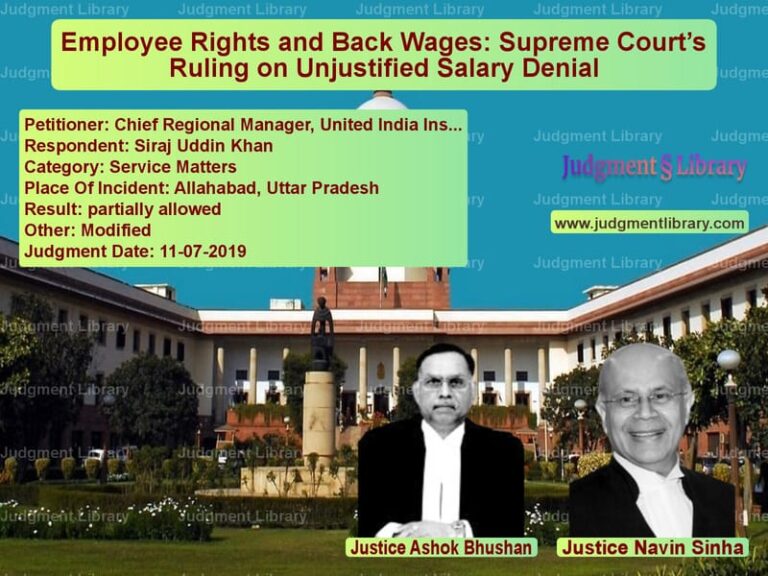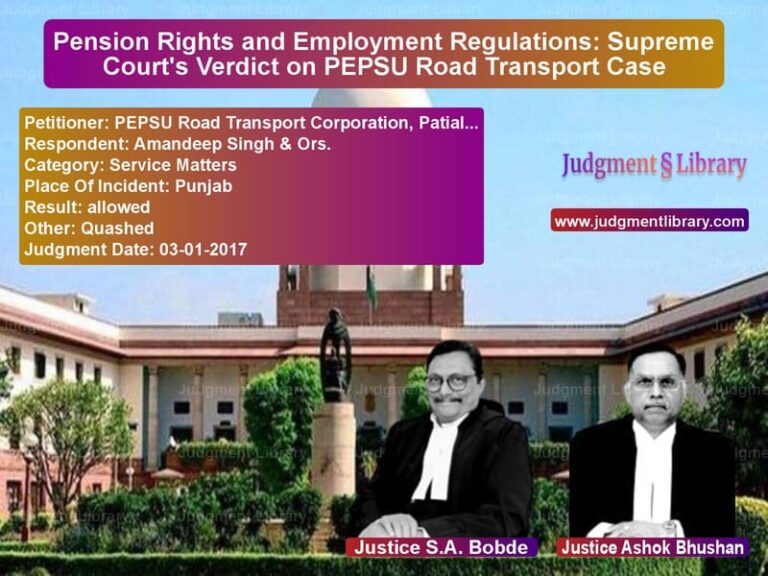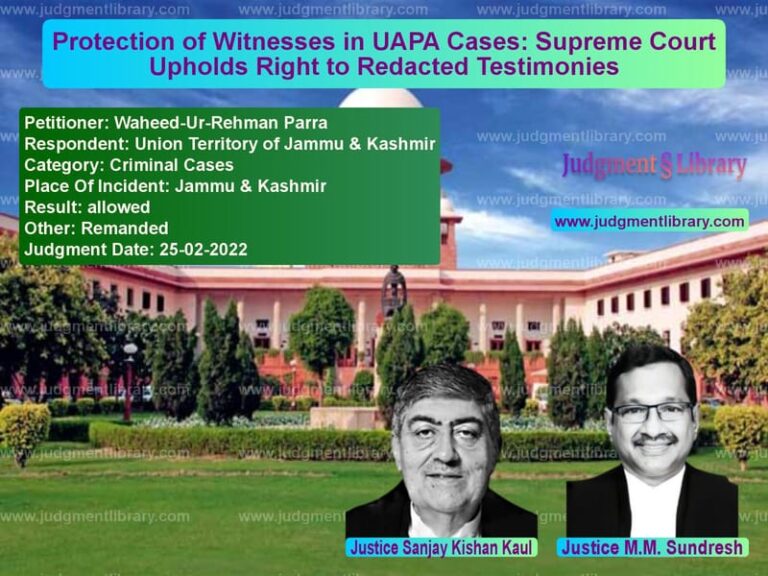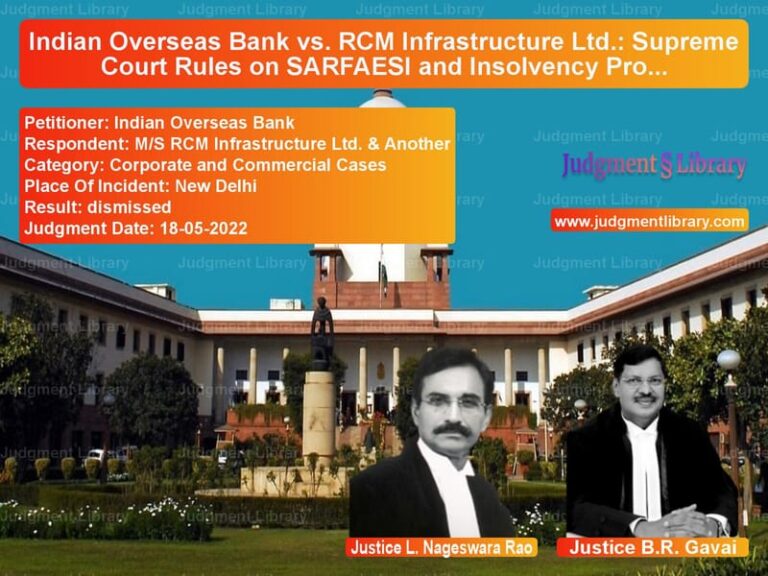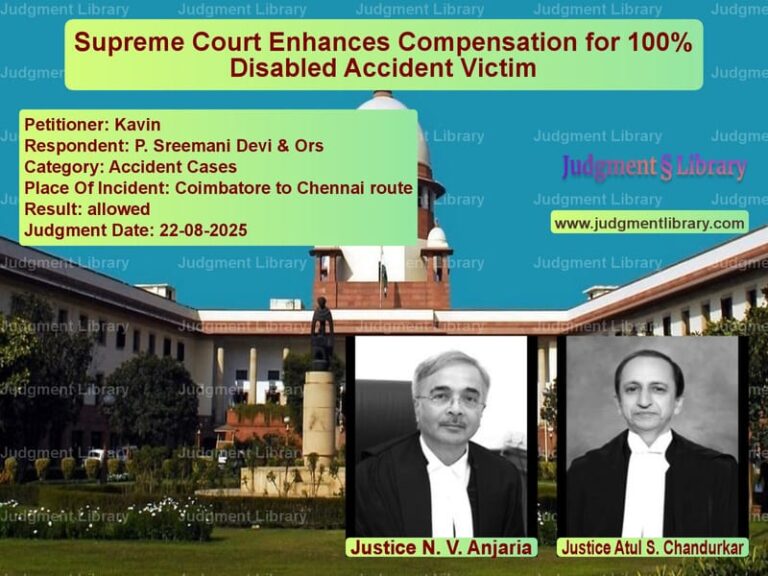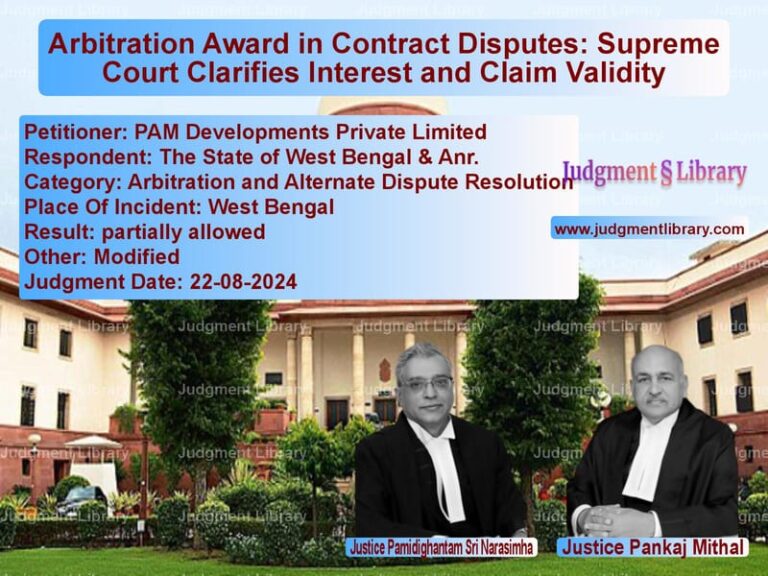Supreme Court Strikes Down Madras High Court’s Power to Debar Advocates
The case of R. Muthukrishnan vs. The Registrar General of the High Court of Judicature at Madras raises crucial questions about the independence of the legal profession, the limits of judicial power, and the role of Bar Councils in disciplining advocates. The Supreme Court of India was called upon to decide whether the amended rules of the Madras High Court, which empowered the High Court to debar advocates from practice, were constitutionally valid.
This judgment carries significant implications for the legal profession in India, as it determines whether High Courts have the authority to discipline advocates by barring them from practice or whether that power exclusively rests with Bar Councils. The decision has reaffirmed the constitutional principle that disciplinary control over advocates is the domain of the Bar Council and not the judiciary.
Background of the Case
The petitioner, R. Muthukrishnan, a practicing advocate, filed a writ petition under Article 32 of the Constitution challenging the validity of the amendments made by the Madras High Court in its rules. These amendments, inserted in Rules 14-A to 14-D of the Rules of the High Court of Madras, 1970, empowered the High Court to debar an advocate from appearing before the court and all subordinate courts for misconduct.
The rules granted the High Court and District Judges the authority to initiate action against advocates for misconduct and to prohibit them from appearing in courts. The alleged misconduct included:
- Accepting money in the name of a judge or on the pretext of influencing him.
- Tampering with court records.
- Abusing or browbeating a judge.
- Participating in processions or protests inside court premises.
- Appearing in court under the influence of alcohol.
The petitioner argued that these provisions were unconstitutional as they conferred upon the High Court powers that exclusively belonged to the Bar Council under the Advocates Act, 1961.
Petitioner’s Arguments
- The petitioner contended that the power to discipline advocates for professional misconduct was exclusively vested in the Bar Council of India and State Bar Councils under the Advocates Act, 1961.
- The impugned rules were ultra vires as they went beyond the scope of Section 34(1) of the Advocates Act, which only permitted High Courts to frame rules regarding the conditions for an advocate’s appearance in court, not to debar them.
- The rules violated Articles 14 and 19(1)(g) of the Constitution, as they provided unbridled power to the judiciary to take punitive actions without due process.
- Debarring an advocate without providing a mechanism for appeal violated principles of natural justice.
Respondent’s Arguments
- The High Court of Madras defended the rules by arguing that they were framed to maintain the dignity of the court and prevent unruly behavior by advocates.
- The amendments were in response to previous Supreme Court judgments directing High Courts to ensure discipline among advocates.
- The rules were framed to curb frequent instances of unruly conduct, protests, and disruptions in the Madras High Court and subordinate courts.
- The High Court relied on the Supreme Court’s decision in Ex-Capt. Harish Uppal vs. Union of India (2003), which held that courts have the power to debar advocates for misconduct.
Supreme Court’s Judgment
The Supreme Court, led by Justice Arun Mishra, struck down the impugned rules and held that they were unconstitutional. The key observations made by the Court were:
- Violation of the Advocates Act: The Court held that the disciplinary jurisdiction over advocates is exclusively vested in the Bar Councils, and the High Court cannot usurp this function by framing rules that provide for debarment.
- Scope of Section 34 of the Advocates Act: The Court clarified that Section 34 empowers High Courts to regulate the conditions of an advocate’s practice but does not permit the framing of rules for disciplinary control or debarment.
- Ultra vires to the Constitution: The rules were held to be in violation of Articles 14 and 19(1)(g), as they conferred arbitrary and unregulated power upon the judiciary to punish advocates without any statutory backing.
- Separation of Powers: The judgment reinforced the principle that courts cannot assume the role of the Bar Council in matters of professional misconduct.
- Power to Debar for Contempt: While the Court acknowledged that it could debar an advocate for contempt of court, such action could only be taken under contempt jurisdiction and not as a matter of professional misconduct.
Implications of the Judgment
This ruling has far-reaching consequences for the legal profession and the judiciary in India:
- Preserving the autonomy of the Bar: The decision upholds the independence of the Bar Council in disciplining advocates and prevents the judiciary from interfering in its jurisdiction.
- Judicial restraint: High Courts cannot exercise disciplinary control over advocates beyond what is permitted by the Advocates Act.
- Due process and natural justice: The ruling ensures that advocates facing disciplinary proceedings have access to statutory safeguards, including the right to appeal.
- Checks on judicial overreach: The verdict prevents High Courts from arbitrarily debarring advocates without following established legal procedures.
Conclusion
The Supreme Court’s ruling in this case marks a crucial reaffirmation of the constitutional principle that disciplinary actions against advocates must be conducted within the statutory framework established by the Advocates Act. The decision prevents High Courts from exercising unchecked power over advocates and ensures that professional misconduct is dealt with through the Bar Council’s disciplinary mechanisms.
This case sets a significant precedent for maintaining the independence of the legal profession while ensuring that courts can still take necessary actions to uphold dignity and discipline through contempt proceedings. It reaffirms the principle that the legal profession must be governed by established legal procedures and not by judicial overreach.
Petitioner Name: R. Muthukrishnan.Respondent Name: The Registrar General of the High Court of Judicature at Madras.Judgment By: Justice Arun Mishra.Place Of Incident: Madras, Tamil Nadu.Judgment Date: 28-01-2019.
Don’t miss out on the full details! Download the complete judgment in PDF format below and gain valuable insights instantly!
Download Judgment: R. Muthukrishnan vs The Registrar Genera Supreme Court of India Judgment Dated 28-01-2019.pdf
Direct Downlaod Judgment: Direct downlaod this Judgment
See all petitions in Fundamental Rights
See all petitions in Constitution Interpretation
See all petitions in Public Interest Litigation
See all petitions in Judgment by Arun Mishra
See all petitions in allowed
See all petitions in Quashed
See all petitions in supreme court of India judgments January 2019
See all petitions in 2019 judgments
See all posts in Constitutional Cases Category
See all allowed petitions in Constitutional Cases Category
See all Dismissed petitions in Constitutional Cases Category
See all partially allowed petitions in Constitutional Cases Category


